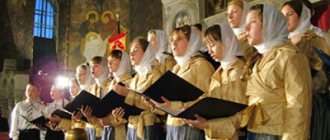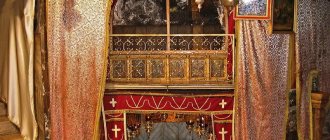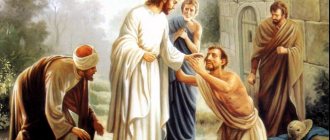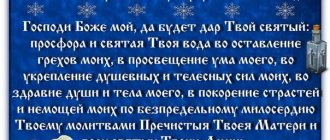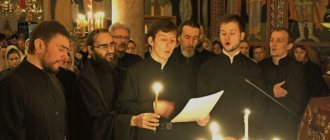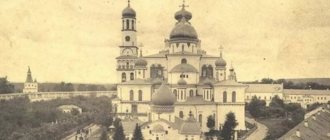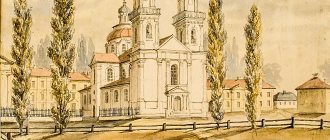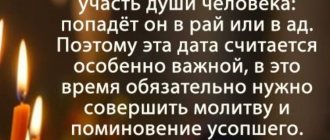Prayer sustained Jesus' spiritual life.
Christ sacrificed Himself for humanity not only on the cross. Every day He “went about doing good” (Acts 10:38) and pouring out His life. There was only one way that could support such a life. Only trust in God and close communication with Him strengthened His strength. Before the gaze of the Creator, under the shadow of the Almighty, people are transformed, this is manifested in their noble deeds. However, due to his sinful weakness, a person does not always remain faithful to Him; faith often weakens, communication with God is interrupted, and all aspirations for a higher ideal fade away. But the life of Jesus was a life of trust in His Heavenly Father and was maintained by constant communication with Him; and therefore His heavenly and earthly ministry was blameless and victorious. As a man, He asked God for strength until His human nature was filled with the heavenly stream that connected humanity with God. Receiving life from God, He imparted life to people (Education, p. 80). The prayer life of Jesus reveals the secrets of spiritual power. — The Savior’s life on earth was a life of communion with nature and God. In this fellowship He revealed to us the secret of vitality (Counsels for Healthy Living, p. 162).
The Battle of Gethsemane as a School of Christian Prayer
But before we move on to the topic in the title, we will have to consider the following question: why did Christ have to endure such great torment for our salvation?
In order to answer this question, we must realize the depth of the fall of the human race, as a result of which only the God-man Christ Jesus could accomplish the work of our Redemption.
Sin is a disease of the soul, transmitted through blood from parents to children
It is impossible to imagine that the sin committed by Adam and Eve is of a certain private nature and does not affect all subsequent generations. From one blood (that is, the blood of Adam - O.S.) He produced the entire human race... (Acts 17:26). That is, all of us, who are involved in Adam by the fact of our conception and generation, are also involved in what Adam and Eve did in the Fall. As it is said that in Adam everyone dies (1 Cor. 15:22). Thus, we establish that sin is a disease of the soul, transmitted through the blood from parents to children. Therefore, David, born into a pious family, was forced to exclaim about himself (more meaning his descent from Adam and Eve): Behold, I was conceived in iniquity, and my mother gave birth to me in sin (Ps. 50:7). That is why St. Augustine writes: “Let no one think that the sin (i.e., the first people - O.S.) was small and light because it consisted of eating from the tree, and, moreover, not evil and harmful, but only forbidden , - the commandment required obedience, such a virtue that in a rational creature is, as it were, the mother and guardian of all virtues”[1]. – That is, the essence of the Fall is in disobedience to the Lord God, when, having rejected the will of the Creator, humanity begins to act in accordance with the will of the devil, imparting legitimacy to evil through such a decision (choice)[2]. The sting of death is sin; and the power of sin is the law (1 Cor. 15:56).
The essence of the Fall is disobedience to the Lord God
It is on the basis that a person is born into this world already infected with the infection of sin that the Church decided to baptize infants. Saint Cyprian of Carthage wrote: “If great sinners who have previously sinned greatly against God, when they believe, are granted remission of sins, and baptism and grace are not forbidden to anyone, much less should this be forbidden for a baby who, having barely been born, has nothing has not sinned, except that having descended from the flesh of Adam, he has received (contraxit) the infection of ancient death through his very birth, and who proceeds to accept absolution all the more conveniently because he is absolved not of his own, but of other people’s sins”[3].
The Church Teacher Tertullian saw the violation of this commandment (about the tree of the knowledge of good and evil) by our ancestors as a violation of the entire Law of God and the entire system of blessed relationships between God and man. Whoever keeps the whole law and sins in one point becomes guilty of all. For the same One who said: Thou shalt not commit adultery, also said: Thou shalt not kill; therefore, if you do not commit adultery, but kill, then you are also a transgressor of the law (James 2:10-11). By agreeing to the call of the serpent-devil (cf. Gen. 3:5), humanity (in the person of our first parents) usurped the rights and priorities of the sovereign power of God. St. Augustine writes: “Here comes pride: because man wanted to be in his own power rather than in God’s; and desecration of the shrine: because he did not believe God; and murder: because he exposed himself to death; and spiritual fornication: because the integrity of the human soul is violated by the conviction of the serpent; and Tatba: because he used a forbidden tree; and covetousness: because he desired more than he should have been content with.”[4]. In other words, humanity found itself in a hostile relationship with God. And, as a visible symbol of these hostile relations[5], God places a Cherubim and a flaming sword turning to guard the path to the tree of life (Gen. 3:24), - that is, a gap was formed between God and humanity, and no one could stand in this gap from the people themselves, for everyone was under the power of sin and could not act as a mediator between sinful humanity and God, since he himself needed such a mediator. I looked among them for a man who would build a wall and stand before Me in the gap for this land, so that I would not destroy it, but I did not find him (Ezek. 22:30). Personal sins committed by people only increased the severity of original sin, and the gap between the Creator and his rebellious creation (humanity) grew stronger and wider. The ancient Christian apologist Tatian wrote: “When people followed the most cunning deceiver and, although he opposed the commandment of God, considered him to be God, then God, by the power of His word, deprived of communion with Himself both the culprit of such recklessness, and his followers, and man created in the image of God, according to the removal of the omnipotent Spirit from him, he became dead.”[6]. Theophilus of Antioch wrote: “From sin, as if from a source, illness, sorrow, and suffering poured out on man.”[7]. That is, humanity has reaped the fruits of its wrong choice. And the need for a mediator who could establish peace between people and God grew. The news about the Mediator and the Destroyer of the power of the serpent-devil sounded back in Paradise. The First Gospel sounded like a kind of war cry, and like a sentence to the serpent. These are the words of hope given to our first parents in Paradise: And I will put enmity between you (i.e. the serpent - O.S.) and between your wife (by “wife” is meant both the Virgin Mary and the Church-Bride - O.S. .), and between your seed (i.e. those who will follow the devil and take his side - O.S.) and between her seed (i.e. Christ, Who was born virginally from the Virgin, without the participation of male seed - O.S.); it (that is, the “seed of the woman,” Christ - OS) will bruise your head (that is, Christ will crush the ideology of the devil and his power - OS), and you will bruise his heel (Gen. 3, 15). What can these last words mean: and you (i.e. the devil - O.S.) will bite him in the heel? The “heel”, as the place closest to the serpent, is the weakest and most vulnerable place of a person. What was vulnerable about the God-man? Of course, our human flesh , His Body. And in the subsequent events of Holy Week we will observe how the devil, through his followers and servants, humiliated, tormented and tormented the Body of our Divine Teacher. But He was wounded for our sins and tormented for our iniquities; the punishment of our peace [was] upon Him, and by His stripes we were healed (Isa. 53:5). And it is also said: the first man Adam became a living soul; and the last Adam is the life-giving spirit (1 Cor. 15:45). “The Last Adam” is Christ, Who comes into this world “for us as humans and for our salvation”, in order to heal, heal and, most importantly, revive us (“life-giving spirit”) in Himself through the purification of His Sufferings (Passion) and With His Blood, restore to us grace-filled communication in the Holy Spirit with God the Father. That is, to reconcile us with God, delivering us from the power of corruption and death.
So, the “last Adam” - the Son of Man - Christ Jesus comes into this world, so that, by teaching (i.e., the light of the gospel gospel - O.S.), he would destroy the handwriting that was about us, which was against us (i.e., all that demonic incriminating evidence accumulated on us - O.S.), and He took it from the environment (i.e., snatched it from the clutches of the demonic “mytniks” - O.S.) and nailed it to the cross (Col. 2, 14) . And when later, having passed through the closed doors, He will say to the disciples: Peace be with you! (John 20:19) - this will mean the cessation of hostile relations with God[8] and the establishment of peace between man and God. Grace and peace to you from God our Father and the Lord Jesus Christ (Rom. 1:7); He (i.e. Christ - O.S.) is the propitiation for our sins, and not only for ours, but also for [the sins] of the whole world (1 John 2:2).
And we read the 36th verse of the 26th chapter of the Gospel of Matthew:
Then Jesus comes with them to a place called Gethsemane and says to the disciples: sit here while I go and pray there (Matthew 26:36).
Christian historian William Barclay writes: “There were no large gardens in Jerusalem itself, because there was not enough free space in the mountaintop city; every square meter was needed for housing construction. And that’s why wealthy citizens had their own private gardens on the slopes of the Mount of Olives. The word “Gethsemane” seems to mean “olive oil press” or “olive oil barrel” or for olives, and Jesus certainly had the opportunity to enter the garden of olive trees.”[9] Apparently, this garden belonged to one of the secret disciples of Jesus Christ, perhaps its owner was a rich man from Arimathea, named Joseph, who also studied with Jesus (Matthew 27:57).
Barclay claims that there could be many such secret disciples: “Someone gave Him a donkey, on which He rode into Jerusalem; someone gave Him the upper room in which the Last Supper took place, and now someone allowed Him to use the garden on the Mount of Olives.”[10]
Christ came to the Garden of Gethsemane to pray, and we should experience the deepest reverence for the prayer struggle that lay ahead of Him. Here He stepped into the gap, which we have already read about from the prophet Ezekiel (cf. 22:30).
Blessed Jerome of Stridon writes: “Gethsemane is explained as a “fertile valley”; there the Lord ordered His disciples to sit down and wait for His return, while He Himself alone prayed for everyone.”[11] – It is not entirely clear here why the prayer of the personal struggle of the Lord Jesus Christ is called by Jerome a prayer “for all . This is due to the fact that the prayer of struggle was decisive for the destinies of many, many people: will the Most Holy Son of God take upon Himself all the sins of the human race, because Divine holiness and sins are incompatible and even opposite concepts. And in this prayerful struggle, Christ had to agree to accept what is incompatible with His God-manhood - human sins, vices and crimes. Anticipating the horror of such a struggle, He takes with Him only the closest disciples, already initiated on the Mount of Transfiguration into the mystery of His Divinity. “Why didn’t He take everyone? So that they would not fall, and took only those who were spectators of His glory[12]”[13].
And then we read:
And, taking Peter and both sons of Zebedee with him, he began to grieve and yearn (Matthew 26:37).
Origen believes that Christ chose not the place of the Last Supper as a place of prayer, since that place had already been desecrated by the betrayal of Judas, he writes: “... it was appropriate, before He was betrayed, to pray and choose a clean place for prayer. After all, He knew that just as the air differs from cleaner air, so the earth of a holy place differs from a more holy one.”[14]
From the point of view of formal neo-Protestant logic, the earth or any object cannot be holy. But from a biblical perspective, this is a mistaken idea of holiness[15].
Garden of Gethsemane
But let's return to the Garden of Gethsemane...
And then we read:
Then Jesus said to them: My soul is sorrowful unto death; stay here and watch with Me (Matthew 26:38).
Some ancient exegetes believed that Christ felt sorrow for His disciples[16]. But not all ancient commentators adhered to this point of view, insisting that Christ experienced precisely human sorrow in Gethsemane, as a True Man in all respects.
Blessed Theophylact of Bulgaria writes: “And he grieves and grieves prudently, so that they may believe that He was a true Man, for it is human nature to fear death. Death did not enter the human race by nature; Therefore, human nature fears death and runs away from it”[17]. Blessed Theophylact sees another reason in this visible grief, he writes: “At the same time he grieves in order to hide Himself from the devil, so that the devil would attack Him as a simple man and kill Him, and through this he himself would be would be deposed"[18]. That is, Satan did not dare to attack Christ as the True God, for both demons believe and tremble (James 2:19), but he could attack, seeing in Him only a man.
What Christ says about: “My soul grieves mortally” is called “mortal melancholy.” This is a state when a person feels, as it were, the breath of approaching death and can no longer stop or change anything[19].
And then we read:
And going away a little, he fell on his face, prayed and said: My Father! if possible, let this cup pass from Me; however, not as I want, but as You want (Matthew 26:39).
Saint Leo the Great, Pope of Rome, interpreted this verse this way: “The Lord, having instructed His disciples to remain vigilant in prayer against constant temptation, He Himself prays: My Father! if possible, let this cup pass from Me; however, not as I want, but as You want. The first petition comes from weakness, the second from strength: He wanted the first, based on our (i.e., human - O.S.) nature, the second - on His own (i.e., Divine nature - O.S.) . Equal to the Father (i.e. in Divinity - O.S.), the Son knew that everything is possible for God; He came down into this world to accept the cross against His will (i.e., as a man - O.S.), so that now He would suffer this struggle of feelings with reason (i.e., as a God-man - O.S.). And here is shown the difference between the perceived nature (i.e., human - O.S.) and the receiving (i.e., Divine - O.S.): what was characteristic of man required Divine power, and what was characteristic of God looked at the human. The lower will (i.e. human - O.S.) was united with the higher will (i.e. Divine - O.S.), and this shows what a fearful person can pray for and what the Divine Healer cannot guarantee ( that is, without our consent and benefit - O.S.), for we do not know what to pray for as we should (Rom. 8:26), and it is good for us that for the most part what we ask is it is not given to us. God, good and righteous, shows His mercy to us when He does not give us what we ask, because it is harmful to us.”[20]
In the battle of Gethsemane we recognize in Jesus Christ the True God and the True Man
Pope Leo shows us that in the struggle of Gethsemane, more than anywhere else, we recognize in Jesus Christ the True God and the True Man. And although these natures differ greatly, they reach agreement in Christ through the subordination of the human will to the Divine will. Thus, in the understanding of Pope Leo the Great, we can and should strive to harmonize our own (human) will with the will of the Creator. That is, it is necessary for everyone to “suffer this struggle of feelings with reason” in order to achieve harmony in our relationship with the Creator. Submit yourselves therefore to God; resist the devil, and he will flee from you (James 4:7).
And then we read:
And he comes to the disciples and finds them sleeping, and says to Peter: Could you not watch with Me for one hour? (Matt. 26:40).
Saint John Chrysostom says: “It is not without reason that He turns especially to Peter, while the other disciples were also sleeping; but here he reproaches him for the same reason that I indicated earlier”[21]. The Apostle Peter said that he was ready to die with the Lord, but he could not help but fall asleep during the hour of prayerful struggle of his Divine Teacher, revealing at that moment both physical and spiritual weakness. Likewise, we are often ready to talk for hours about great spiritual truths, but we stand for fifteen minutes of evening prayer - and it is difficult to understand where all our spiritual vigor and determination go. However, it is said that the flesh desires what is contrary to the spirit, and the spirit what is contrary to the flesh: they oppose each other, so that you do not do what you would like (Gal. 5:17).
And we read further:
Watch and pray so as not to fall into temptation: the spirit is willing, but the flesh is weak (Matthew 26:41).
Blessed Jerome of Stridon teaches: “We do not completely refuse to face temptation, but we pray for strength to resist it. That is why He (i.e. Christ - O.S.) does not say: “Watch and pray, lest you be tempted,” but lest you fall into temptation, that is, lest temptation consume you and hold you in its networks. For example, a martyr who shed blood for faith in the Lord was, of course, tempted, but was not caught in the net of temptation. But the one who rejects faith falls into the snares of temptation. The spirit is willing, but the flesh is weak. This is said against frivolous people who believe that they can achieve what they believe in. And so, as much as we believe in the ardor of our spirit, we must equally fear the weakness of the flesh.”[22]
Christ reveals the secret of real prayer - it must be conciliar in nature
But what can vigorous prayer mean if not prayer in the Holy Spirit, for the flesh is inert, but the spirit is always vigorous and active. It is said: Pray at all times in the Spirit with all prayer and supplication, and strive for this very thing with all perseverance and supplication for all the saints (Eph. 6:18). - Here it seems that adding at the end of this verse the phrase and try about this very thing with all constancy and prayer for all the saints reveals the true secret of real prayer - it should be of a conciliar character, because Christ did not teach us to pray: “My Father,” but, on the contrary: “Our Father” (cf. Matt. 6:9), so that in deeply personal prayer requests we always have in mind all the saints, that is, all Christians. Therefore, the prayer struggle of the Son of God in Gethsemane, despite the personal nature of the struggle, needs the participation or sympathy of His disciples, for which He repeatedly tries to awaken them.
And then we read:
Again, going away another time, he prayed, saying: My Father! If this cup cannot pass from Me, lest I drink it, Thy will be done. And when he came, he found them sleeping again, for their eyes were heavy. And leaving them, he went away again and prayed a third time, saying the same word (Matthew 26:42-44).
Here we see the triumph achieved by Christ, as the Son of Man, over mortal melancholy. And He hurries to the disciples, who must also learn to overcome any fear with the power of prayer and deep trust in God, but He finds them sleeping again, for their eyes are heavy. And He retreats to the previous place of prayer struggle, where he prayed for the third time, saying the same word. Repeating the same words: Thy will be done is done in order to testify to the decision made to fulfill the will of the Heavenly Father. The threefold prayer may indicate that the Son of Man addressed in the prayer of struggle both to God the Father, and the Holy Spirit, and to His True Divinity, as we read above from Pope Leo the Great: “... and the things that are proper to God looked upon the things that are human” (i.e. i.e. the Son of God contemplated the Son of Man). Thus, Christ teaches us (as the holy fathers also commanded us), when turning in prayer to God the Father, to keep in mind both God the Son and God the Holy Spirit.
We are someone and something in Christ and with Christ; and we are nobody and nothing without Christ!
Christ could address God the Father with the words: “ My !”, since He is the Son of God by nature, and we are children only by grace and pray “Our Father”; therefore, His power is in the Divine unity of the Persons of the Holy Trinity, and ours is in catholicity, to which Christ calls us with the words: may they all be one, as You, Father, are in Me, and I in You, so may they also be in Us united. (John 17:21).
Origen writes: “While Jesus was with His disciples, they did not sleep, but as soon as He departed a little from them, they could not stay awake for one hour in His absence. Therefore, let us pray that Jesus will never leave us even close, but will fulfill what he promised us, saying: I am with you always, even to the end of the age (Matthew 28:20). Indeed, in this way we will remain awake, because He will drive away sleep from our souls...”[23].
And indeed, we are someone and something in Christ and with Christ; and we are nobody and nothing without Christ!
Jesus' humanity made prayer a necessity.
Since Christ became a man, He constantly felt the need for reinforcement from His Father. He had His favorite places to pray. He enjoyed communing with His Father in the solitude of the mountains. Through these spiritual exercises His holy human soul was strengthened to perform the duties and endure the trials of the next day. Our Savior delves into all our needs and weaknesses, for He Himself was a supplicant, Who prayed at night and sought new strength from His Father. Thus receiving spiritual energy and reinforcement, He was ready to perform the duty and endure the trials of the next day. He is our example in everything. He is a brother in our weaknesses, but not in our passions. Being sinless, He turned away from all evil, for evil was hateful to Him. He experienced painful struggle and excruciating agony in this sinful world. His human nature made prayer a vital need and advantage. He needed more and more Divine support and consolation, which His Father was ready to give to Him, for the good of man, who left heavenly joy and chose the cold and ungrateful world as His home. Christ found comfort and joy in fellowship with His Father. In prayer, He relieved His heart from the sorrows that weighed heavily on Him. He was a man of sorrows, acquainted with illness. During the day He worked zealously to do good to people and save them from destruction. He healed the sick, comforted the grieving, and brought joy and hope to the hopeless. He brought the dead back to life. When He finished His daily labors, He would retire far from the noise and bustle of the city and kneel in some remote grove to offer His prayers to the Father. He prayed evening after evening. Sometimes the bright moonlight illuminated His bowed figure, and then the clouds again obscured the moon. As He prayed in such a humble posture, night dew or frost fell on His head and beard. Often He expressed His requests to the Father throughout the night. He is our example. If we remembered this and imitated Him, we would be much stronger in God. If the Savior with His Divine power felt such a need for prayer, then how much more do we, weak, sinful mortals, need it; how earnestly and tirelessly we must pray! When Christ was overcome by the most powerful temptations, He fasted. He dedicated Himself to God and, through earnest prayer and submission to the will of His Father, emerged victorious. Those who profess the truth for these last days should, more than all other Christians, imitate the great Pattern in all that concerns prayer. “It is sufficient for a disciple that he should be like his teacher, and for a servant that he should be like his master” (Matthew 10:25). On our tables you can often see delicacies, the consumption of which is not necessary and which do not add to our health. But we love them more than self-denial, freedom from disease and a sober mind. Jesus earnestly sought to draw strength from His Father. The Son of God considered this circumstance more valuable to Himself than sitting at the most luxurious table. He has given us a testimony that prayer is necessary to gain power to combat the forces of darkness and to do the work assigned to us. Our own strength is actually weakness, but the strength that God gives is great and powerful. It will make everyone who receives it more than a conqueror (Testimonies for the Church, vol. 2, pp. 201-203).
Parables about prayer
In one of His many parables, often called “The Parable of the Unjust Judge,” Jesus Christ taught that “we ought always to pray and not to lose heart” (Luke 18:1). This parable talks about a woman who asks a judge: “Protect me from my adversary.” She does not stop her requests, and in the end the judge answers her. We are taught to pray continually, remembering that God knows the best time for His answers. In some cases, even if our will is the same as God's, events will happen to us that will impact our lives and answers will come when it is best for us and when it will allow others to receive the most spiritual help.
Jesus followed this parable with another, the parable of the Pharisee and the tax collector (Luke 18:9-14). In this famous parable, Jesus Christ asked His listeners to consider why they pray, pointing out that prayer in itself has no meaning. The most important indicator of how effective our prayers are is the condition of our heart.
Jesus made time for prayer, no matter how busy or tired He was.
Christ did not spare Himself in His ministry. He did not measure His work by hours. His time, His heart, His soul and energy were given to work for the benefit of the human race. His days were filled with tedious, toil, and at night He bowed in prayer, asking for grace and endurance to be able to do even more. In passionate prayer, with tears, He sent His petitions to heaven, so that His human nature would be strengthened, and He could gather His courage, meet fully armed the evil enemy with all his tricks and receive support in His mission to uplift the human race. To His fellow workers He says, “I have given you an example, that you also should do the same things that I have done” (John 13:15) (The Ministry of Healing, p. 500). Jesus prayed early in the morning. —Early mornings often found Him in solitude, meditating, studying the Scriptures, or praying. By singing He greeted the morning dawn. With hymns of thanksgiving, Jesus encouraged Himself and brought heavenly joy to the weary and discouraged (Counsels for Healthy Living, p. 162).
Jesus prayed in special places.
We must have a place for secret prayer. Jesus had favorite places to communicate with God, and we should have the same places. People sometimes have an urgent need to withdraw for a while and remain alone with God (Christ's Sermon on the Mount, p. 84). Jesus prayed for us. — Jesus often exhausted himself from backbreaking labor, self-denial and self-sacrifice, blessing the suffering and needy. He spent nights in prayer on the desert mountains, not because He was weak or in need, but because He saw and felt your natural weakness to resist the temptations of the enemy in all the areas where he now overcomes you. The Lord knew that you would be indifferent to danger and would not feel the need for prayer. It was for our sake that He offered His prayers to the Father, crying and weeping greatly (Testimonies for the Church, vol. 3, p. 379).
Matthew 14:23
Another moment when we see Jesus Christ praying is described in the fourteenth chapter of the Gospel of Matthew. Again, it is important to know the context. This time the day was not only tense, but it also began very sadly for Jesus, because on this day he learned of the beheading of John the Baptist (for beheading, see verses 1-11):
Matthew 14:12 “And his disciples [John’s disciples] came and took his body and buried it; And they went and told Jesus.”
Before we move on, how would you feel if you knew that your brother, who always supported you and was loyal, was killed in such a terrible way? I think you would be in a lot of pain and would prefer to be alone for a while. This is what Jesus wanted:
Matthew 14:13 “And when Jesus heard it, he departed from there in a boat to a desert place alone.”
His removal to a deserted place was not something planned, because he did it by “HEARING.” Clearly, Jesus needed rest after the shocking news. But he didn't stay there forever. Some time later he returned from his retreat and saw a huge crowd waiting for him. When he saw her, Jesus “had compassion on them and healed their sick” (verse 14). He not only healed their sick, but also miraculously fed them (verses 15-21). Next, verse 22 tells us what happened after this feeding:
Matthew 14:22 “And immediately Jesus compelled his disciples to get into the boat and go before him to the other side, until he sent the people away.”
The word “immediately” is associated with feeding the crowd and means that immediately after the crowd was fed, Jesus forced his disciples to get into the boat. Notice the word “forced.” The corresponding word in Greek is the past tense verb anagkazo, which means “to force someone to do something even if they don’t want to.” So, according to the above passage, Jesus made his disciples get into the boat. Perhaps they didn't want it. But he didn't discuss it. He forced them to do so. Then he dismissed the crowd. The question you may have is why did he make his students leave? What did he plan to do after he dismissed the crowd? The answer is in verse 23:
Matthew 14:23 “And when He had sent the crowd away, He went up into a mountain to PRAY alone; and in the evening I remained there alone.”
The reason he did not allow the disciples to stay, but made them get into the boat and sail away, was because he wanted to be alone and PRAY. Look how important prayer was to Jesus Christ. In order to pray, he wanted to get up very early in the morning, get away from the crowd, make the disciples leave. Doesn't this show that prayer was a TOP priority in his life? Of course yes. Let us appreciate these lines and believe what the Word says about the importance of prayer—so that we make it a top priority in our lives as well.
Jesus' disciples were impressed by His habit of prayer.
“The Son of Man did not come to be served, but to serve” (Matthew 20:28). He lived, taught and prayed not for His own sake, but for the sake of others. Every morning after hours spent with God, He brought heavenly light to people. He received a new baptism in the Holy Spirit every day. In the early hours of the new day, the Lord roused Him from sleep, and His soul and lips were anointed with grace that He might impart it to others. From the heavenly abodes words were sent to Him - words that He spoke at the right time to the weary and oppressed. “The Lord God has given Me the tongue of the wise, that I might be able to strengthen with words the one who is weary; Every morning He awakens, awakens My ear, that I may listen like the disciples” (Isa. 50:4). The disciples of Christ were impressed by His prayers and His habit of communication with God. One day, after a short absence from their Lord, they found Him immersed in prayer. Seemingly unaware of their presence, He continued to pray loudly. The hearts of the disciples were deeply touched. When He had finished praying, they exclaimed, “Lord, teach us to pray.”—The Review and Herald, August 11, 1910.
The Lord's Prayer is beautiful in its simplicity.
Jesus taught His disciples that only that prayer is genuine which comes from unfeigned lips and is moved by the real needs of the soul. He taught His disciples a short, comprehensive prayer. This prayer, beautiful in its simplicity, has no equal. This is the perfect prayer for both public and private life; it is sublime and dignified, yet so simple that a child sitting on its mother's lap can understand it. God's children have repeated this prayer for centuries, yet its radiance has not dimmed. She continues to be loved and cherished like a precious pearl. This prayer is wonderful. No one will pray in vain if his prayers contain the principles present in it. Our public prayers should be short and express only the real needs of the soul, revealing in simplicity and trusting faith exactly what we need. Prayer from a humble, contrite heart is the living breath of a soul thirsting for righteousness.—Signs of the Times, December 3, 1896.
Jesus knelt when he prayed.
When we offer our prayers to the Lord, both in public worship and in private, we may kneel. Jesus, who is our Example, “knelt and prayed.” It is also said of His disciples that they “knelt down and prayed.” The Apostle Paul says: “I bow my knees to the Father of our Lord Jesus Christ.” Ezra, confessing the sins of Israel to God, “bowed his knees.” Daniel knelt three times a day and prayed to his God and praised Him (Messages to Youth, p. 251).
Why do you need to pray?
In addition, the Gospels contain Jesus Christ's teachings on prayer. For example, Jesus told His disciples:
“And I will say to you: ask, and it will be given to you; seek and you will find; knock, and it will be opened to you. For everyone who asks receives, and he who seeks finds, and to him who knocks it will be opened” (Luke 11:9-10).
This is a magnificent promise that can be applied every minute, every hour and every day. Many underestimate this promise, and some may not study or apply it enough. Through prayer we strengthen our connection with God and the Savior. Thanks to our prayers, God can provide us with His help, which He is always ready to provide. Prayer gives us access to God's power, His perspective, and brings us peace. Prayer is the opposite of pride, for it demonstrates that we rely on the Lord and His sacrifice, praying in His name and thanks to Him.
